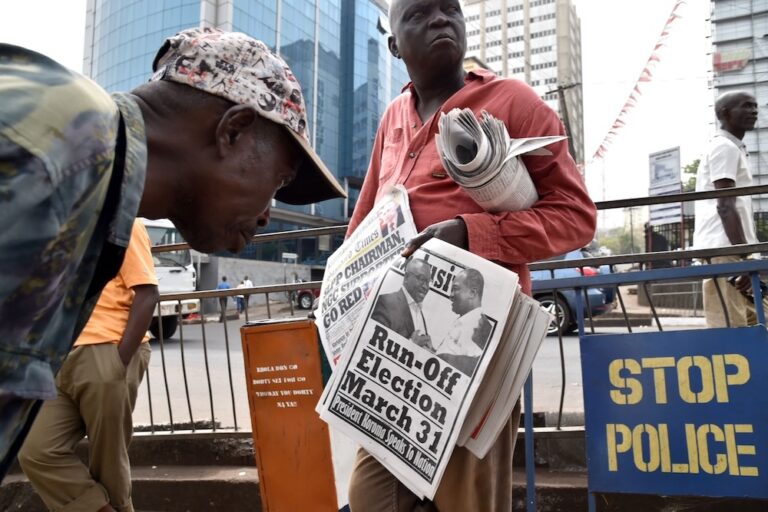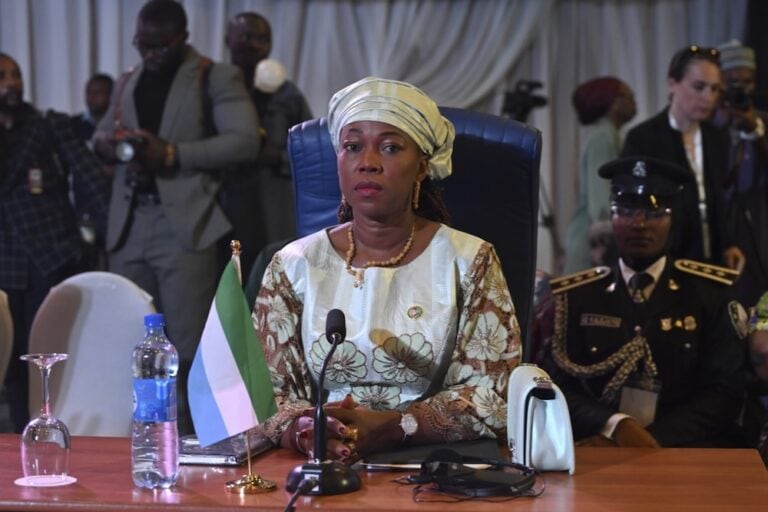(ARTICLE 19/IFEX) – The following is a second ARTICLE 19 submission to the Government of Sierra Leone on the Independent Media Commission Bill, following the response of the minister of information and culture to ARTICLE 19’s first submission: 17 September, 1999 SECOND SUBMISSION BY ARTICLE 19 TO THE GOVERNMENT OF SIERRA LEONE ON THE INDEPENDENT […]
(ARTICLE 19/IFEX) – The following is a second ARTICLE 19 submission to the
Government of Sierra Leone on the Independent Media Commission Bill,
following the response of the minister of information and culture to ARTICLE
19’s first submission:
17 September, 1999
SECOND SUBMISSION BY ARTICLE 19 TO THE GOVERNMENT OF SIERRA LEONE ON THE
INDEPENDENT MEDIA COMMISSION BILL, NO. 99 OF 1999
ARTICLE 19 is grateful to the Minister of Information and Culture, Dr Julius
Spencer, for his comments of 13 September 1999 in response to our first
submission on the Independent Media Commission (IMC) Bill of 26 August 1999.
We would like to respond briefly to some of the Minister’s comments. The
Minister has agreed that his comments can be made public. They can be found
as an annex to this submission. We suggest that interested parties refer
first to his comments before reading this submission. Our submission is
addressed directly to the Minister.
On statutory regulation of the print media and income tax provisions
1. You argue that important public interest considerations with regard to
the print media are sufficient justification for statutory regulation. We
would not dispute your contention that such public interest considerations
exist. You also argue that government has a responsibility not just to
protect and promote freedom of expression, but also to protect the rights of
all citizens from abuse. Again, as a general position, we would not dispute
this. However, the issue in practice is the difficult one of how to find the
right balance between the two responsibilities you describe. Our view is
that freedom of expression is a fundamental human right in relation to which
any restrictions should be strictly necessary, proportionate and prescribed
by law. Restrictions should also be narrowly drawn and clearly defined.
Where there is any room for doubt as to whether these tests are being met,
governments should restrain themselves from imposing restrictions. In
addition, the rights of citizens can be adequately protected in general law.
We do not believe that there is any need to create specific provisions with
regard to the print media. Accordingly, we continue to believe,
notwithstanding your response to our submission of 26 August, that the
proposed Independent Media Commission (IMC) Bill, as it stands, fails the
tests set out above.
2. It is neither necessary nor proportionate, in our view, that the proposed
legislation creates a penalty upon newspapers and magazines which is
additional to those which companies more generally face under the Income Tax
Act. If the provisions are the same as for all other businesses, as you
suggest, why then create another legislative provision which simply repeats
what already exists? The only motivation we can ascertain is a political
motivation. There have been persistent allegations that the government is
targeting the print media on the income tax issue over and above its actions
with regard to companies more generally. The Government of Sierra Leone has
engaged in periodic acts of harassment of the print media over the past two
years in response to what it claims are untrue stories or stories which
threaten national security. In the absence of a properly functioning
judiciary, it has appeared to assign itself the role of sole arbiter in
these matters, although some have claimed that the real arbiter has at times
been ECOMOG. The question arises of whether, through these actions, the
government has been acting to protect the rights of all citizens from abuse,
or suppressing unwelcome or embarrassing information which the people of
Sierra Leone have the right to know about in relation to those in positions
of power and authority. It is difficult to avoid concluding that, through
the income tax provisions of the IMC Bill, the Government of Sierra Leone is
looking for an ostensibly “technical” means of controlling the private press
which will draw less international criticism than periods of detention or
the laying of “false reporting” charges.
3. We remain of the view that sections 17-21, which provide for the
registration of newspapers and magazines are unnecessarily complicated and
could have a “chilling effect” on freedom of expression in Sierra Leone. We
are aware that there has been a longstanding debate in Sierra Leone about
low professional standards within journalism. But this is not an issue which
can be resolved through administrative measures which may threaten freedom
of expression. While you emphasize “local conditions” and the need to
protect the public from “criminals and con artists who sometimes masquerade
as newspaper proprietors,” we retain a belief that Sierra Leonean readers
can make their own judgement about which newspapers are bona fide newspapers
and which are not. Further, if they are “protected” from exercising that
discretion themselves, they are less likely to develop it. If journalists
are alleged to have committed a recognizably criminal offence, the
authorities can charge them accordingly and bring them promptly to trial.
Finally, given the small readership of newspapers and magazines in Sierra
Leone, the requirements seem to us to be like using a sledge-hammer to crack
a nut. We suspect that the cumbersome registration requirements proposed
reflect the concerns of public figures mainly located in Freetown rather
than those of the general public throughout Sierra Leone.
4. While ARTICLE 19 does not as a matter of principle favour statutory
regulation of the print media, we acknowledge that it is to be found in many
countries. Where it operates, the degree to which there is general respect
for human rights, including freedom of expression, is absolutely crucial.
Statutory regulation tends to be least harmful where that respect exists and
is well-entrenched in society. Nobody can pretend that this is yet the case
in Sierra Leone. As we stated in our submission of 26 August 1999, we
believe that the statutory regulation proposed is highly likely to lead in
practice to unacceptable restrictions upon freedom of expression. If the
government is determined to press ahead with statutory regulation of the
print media, we would invite you to consider the press legislation recently
passed in Indonesia as an interesting example of an attempt to create a
“benign” form of statutory regulation which does not – at least in theory –
unduly restrict freedom of expression. We have provided you with a copy of
the Indonesian legislation at the Bill stage and will happily obtain a copy
of the final Act if you wish us to do so. Although the text of the final Act
does not yet exist in English, we understand that there were only minor
amendments to the legislation between the Bill and Act stages [copies of the
Indonesian legislation can be provided to other interested parties by
ARTICLE 19 on request].
Other issues
5. Regarding point 5 of your reply to our submission of 26 August 1999, on
provisions for the granting, refusing or revoking of broadcast licences, we
shall have to agree to disagree. In countries where democracy is as fragile
as it is in Sierra Leone, we believe that every effort should be made to
provide positive reinforcement for fundamental rights such as the right to
freedom of expression. Bodies such as the IMC should have the underlying
principles upon which they are to exercise their discretion regarding
licensing explicitly stated in order to prevent abuse. It would also enable
broadcasters to know exactly what is required of them as they prepare
licence applications. Our original proposal that “public interest” be
defined in section 10 as having a positive bias towards promoting media
pluralism was made in this spirit.
6. We note your clarification regarding section 3(b). We continue to hope
that you might agree to change the wording of the Bill, as it stands,
regarding the IMC securing “compliance” with government policy on
media-related matters.
7. We very much welcome your agreement to remove the Minister of Information
from the appeals process regarding broadcasting licences which have been
refused, suspended or cancelled under section 15(1).
8. We remain of the view that Section 16 is not really necessary.
9. We also very much welcome the amendment which you now propose to section
40. We note your point that statutory regulations can only be enacted by
parliament. However, our argument was in part based upon the practice in
many countries, including in the developed world, where such regulations go
through “on the nod” at times when many parliamentarians are not present.
Hence our belief in the need not just for parliamentary assent, but also for
proper debate. We acknowledge that this places a responsibility not just on
government, but also on parliamentarians.
10. Your proposal to add a provision for the IMC to make regulations
regarding conflict of interest issues is also welcome. However, our form of
words suggested an initial definition of what a conflict of interest might
be in a way that your wording does not. Might not the IMC welcome some
guidance in law on which to base its regulations?
11. We welcome your undertaking to add provisions which would give the IMC
powers to establish clear limits on media ownership.
12. We also welcome your agreement to give the IMC responsibility for
ensuring that all political parties have equitable access to, and fair
coverage in, the broadcast media during elections.
Conclusion
In summary, the changes which you have proposed undoubtedly improve the
Bill. We welcome them warmly. But they do not touch upon what we regard as
the fundamental question regarding its bona fides. What is the real reason
behind the determination of the government to introduce statutory regulation
of the print media? The provisions regarding income tax suggest that the
motivations are those of control and punishment rather than the protection
and promotion of freedom of expression. Once again, we urge the Government
of Sierra Leone to reconsider its position on this issue.
ANNEXURE
13 SEPTEMBER 1999
RESPONSE BY THE MINISTER OF INFORMATION AND CULTURE TO ARTICLE 19’S
SUBMISSION OF 26 AUGUST 1999
1. While acknowledging that the Print media has to be treated differently
from the electronic media as far as statutory regulation is concerned, in
the context of Sierra Leone, there are important public interest
considerations in relation to the print media. While Government has a
responsibility to protect and promote freedom of expression, it also has a
responsibility to protect the rights of all citizens from abuse.
2. The provisions for Newspaper registration relating to income tax are the
same as those for all other businesses.
3. There is nothing cumbersome or potentially restrictive about the
provisions relating to the print media. Careful reading of the bill will
reveal that all a newspaper proprietor is required to do is pay income tax,
pay the required registration fee and submit accurate information relating
to the name of the newspaper, business address and name and address of
proprietor.
4. Article 33 (3) of the Bill makes provision for public hearings of the
commission and receiving petitions.
5. In relation to the suspension or cancellation of broadcast media
licences, I believe the provisions of sections 14 (1), (2) & (3) provide
sufficient safeguards against abuse.
6. The issue of review of existing laws relating to the media will soon be
addressed. As you have noted, recent events and inadequate staff in the Law
Officers Department have delayed the process.
OTHER CONCERNS
1. Reference to legislation under objects of the commission relates to media
activities. In other words it is legislation on media activities and
Government policy on media activities.
2. The point about appeals to the Minister is taken. It was intended to
speed up the process. However, it will possibly bring in political
considerations. This intervening stage will be dropped.
3. Section 16 is related to section 11(c).
4. Sections 17 – 21 create registration requirements that take into account
local conditions. What to you seems an unnecessarily detailed process in
sections 23 – 25 is essential to protect the public against abuse by
criminals and con artists who sometimes masquerade as newspaper proprietors.
Government has no intention to “control” or restrict the print media.
5. Section 29 (2) is simply intended to ensure that there are authenticated
copies for official record purposes. There is nothing bureaucratic or
unnecessarily time consuming in it. Without such a provision, there will be
no simple means of proving that a particular edition of a newspaper was
published by the proprietor whose name is printed on it.
6. Your comments in relation to section 40 are noted. The issue of the
Minister making regulations is noted. A subsection will be inserted stating
the following: “The Minister will only make such regulations on the advice
of the commission.” Statutory regulations can only be enacted by
Parliament.
7. In relation to your concerns about issues you feel have not been fully
addressed by the Bill. I will state as follows:
(a) Parliamentary confirmation hearings are now public events.
(b) In relation to conflict of interest your point is taken. The following
provision will be added to the Bill: “The commission shall make other
regulations as it deems fit governing the conduct of members of the Board in
relation to issues of conflict of interest.”
c) Your point on media ownership is taken and will be added on to section
(4)
(d) Your concern about economic climate is taken care of by section 3(c),
i.e promotion of fair competition.
(e) Your point about equitable access for political parties is taken and
will be reflected in the bill.


